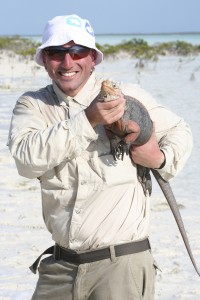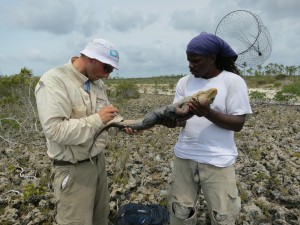The Fund provided support to Mr. Giuliano Colosimo, a graduate student at Mississippi State University, to study the population genetics of Andros Rock Iguanas in the Bahamas. Although Andros is considered to be the largest island of the Bahamas archipelago, it is composed of four large landmasses, North Andros, Mangrove Cay and Alcorine Cay, and South Andros, separated by saline tidal channels called bights. Giuliano wanted to know whether or not these landmasses were home to genetically distinct sub-populations of iguanas.
The DNA from more than 180 individual iguanas was collected for analysis.
Among the three populations the one residing in the central portion of the Island (Mangrove Cay and Alcorine Cay) was the most genetically variable (as well as the densest population). In this study it was documented that the water channels naturally fragmenting the island appear to play a major role in limiting successful migration, and suggests that water bights constitute a major barrier to the dispersal of individuals.
This study helps justify the decision in 2009 to expand the boundaries of the West Side National Park to include Alcorine Cay and segments of Mangrove Cay. The molecular data confirm the strategic importance of these new boundaries. The data also suggest, however, that populations with unique genetic signatures reside outside the boundaries of the park and that efforts should continue to ensure that iguanas across the island remain protected.



